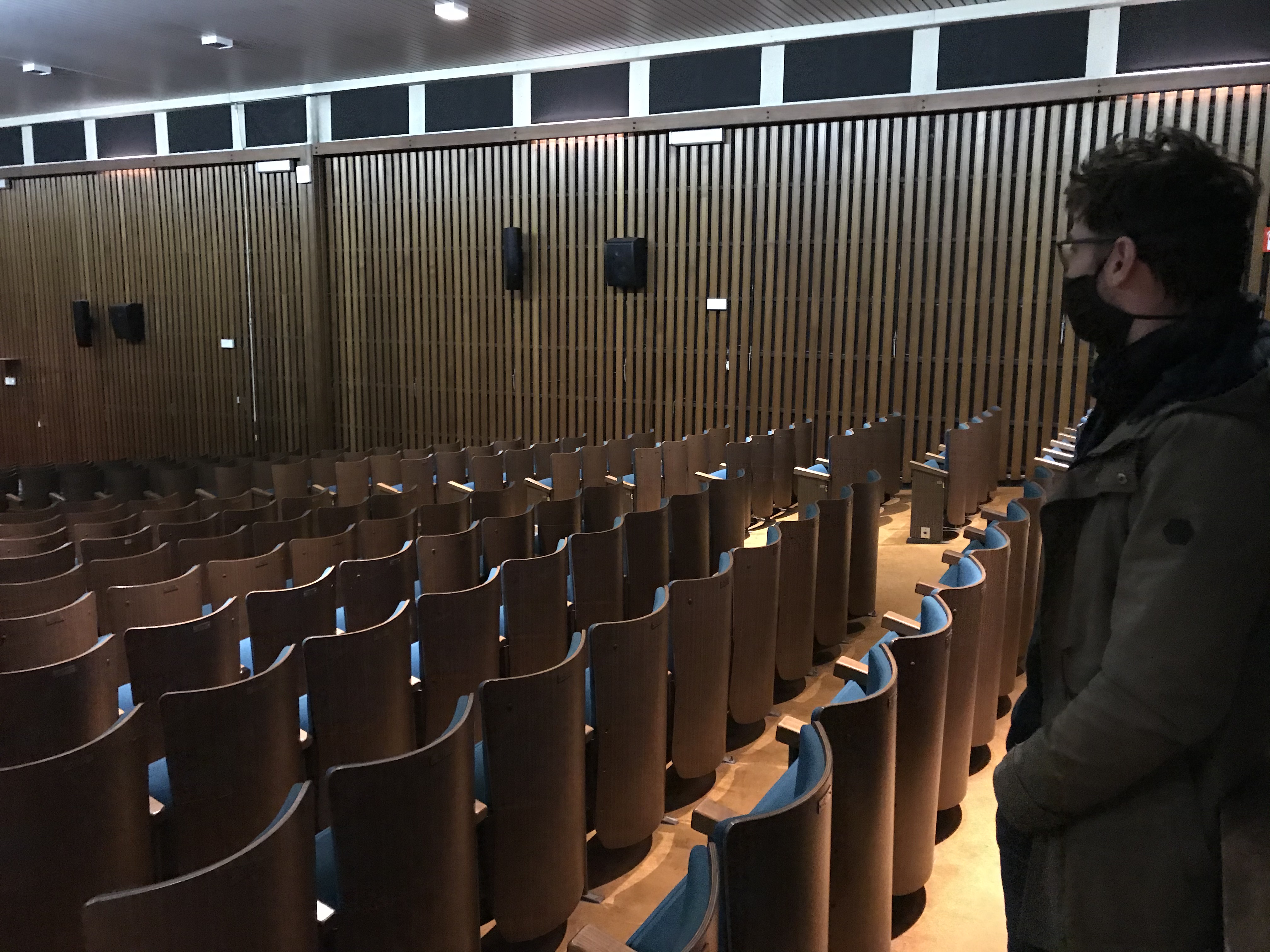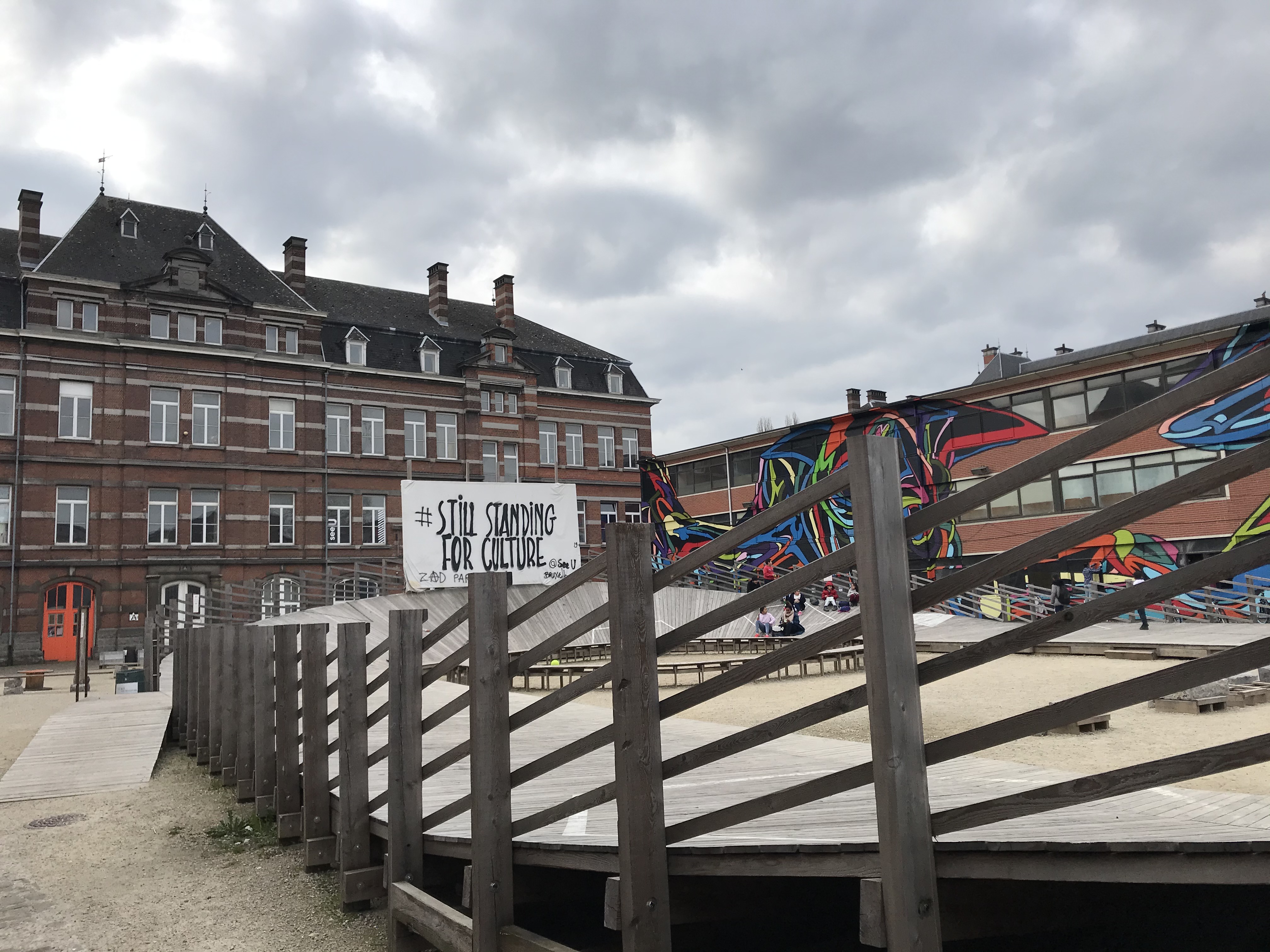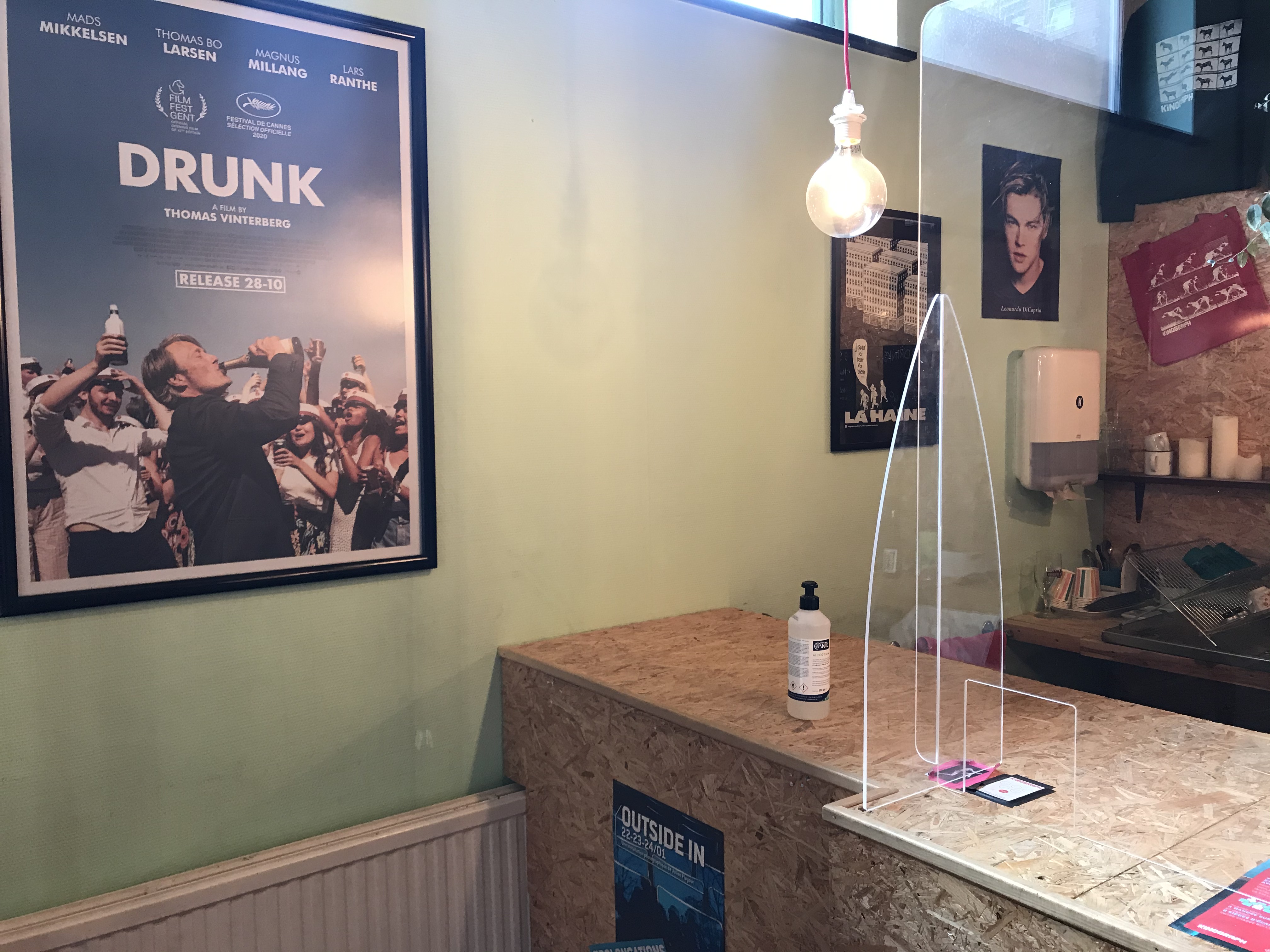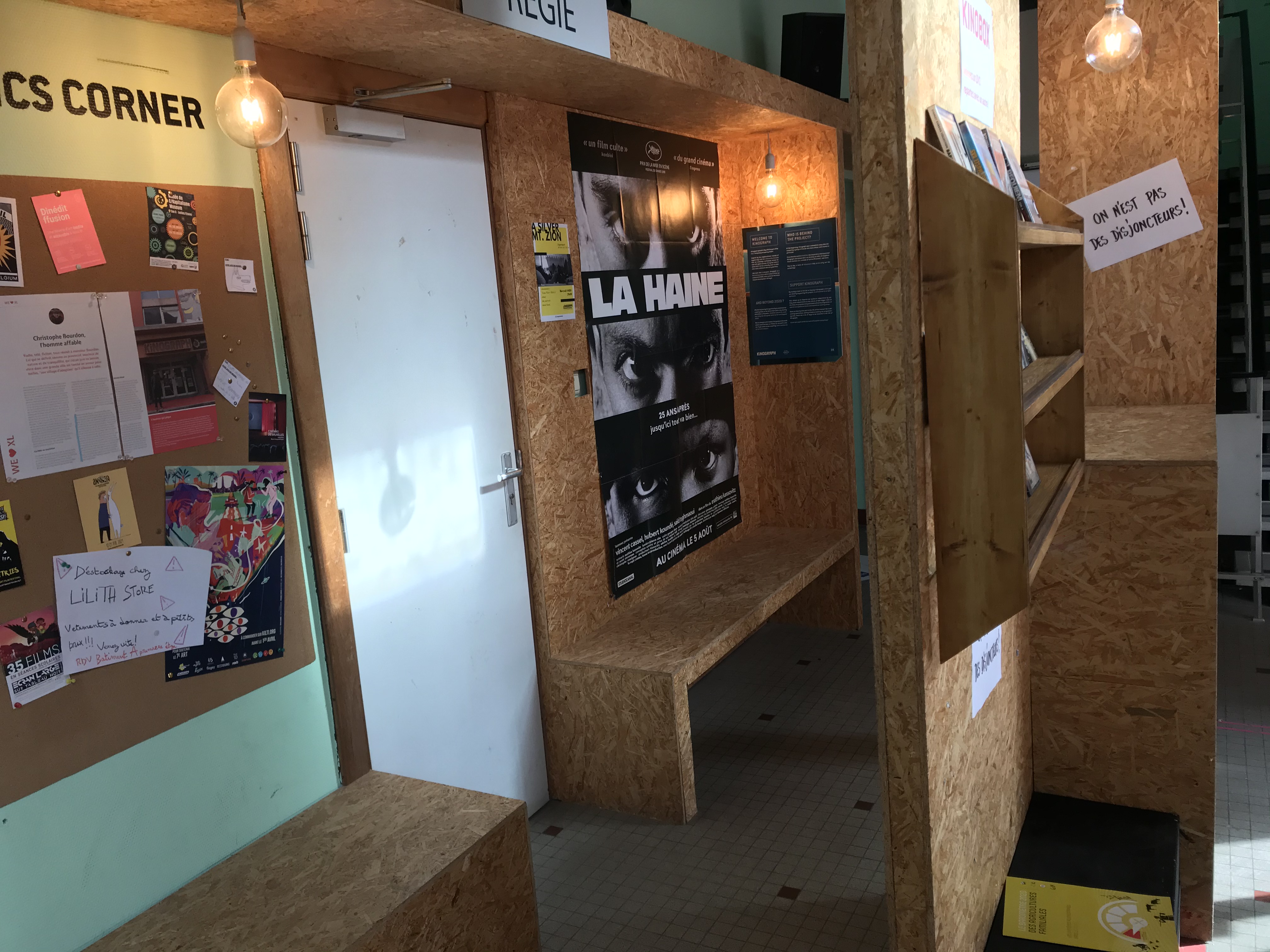Like other cinemas, the doors of Kinograph at the temporary See U site in Ixelles have been closed to moviegoers for six months. But the team has not been idle and is getting ready for the relaxation of coronavirus restrictions, as well as some new projects with partners including VUB. We will have to wait a little longer for an actual visit, but we can already take VUBers behind the scenes at the former police barracks.
Read more inspiring stories:
Wouter Hessels: Film as a bridge to a shared world.
Inge Placklé: Building education together
Adam Alexander Jukl. Seizing opportunities is a moral duty.
Kevin Smets. Pushing boundaries with images
VUB film festival starts with ‘Partnership’
It’s quiet at the old barracks on Kroonlaan in Elsene, near the currently equally quiet Humanities, Sciences & Engineering campus of the VUB. But if it were up to the coordinators – and VUB – that would soon change. The See U project is the transitional phase of the Usquare.brussels project, which runs until March 2022. It’s a partnership between the Brussels region, VUB and ULB that aims to open up the historic site to the neighbourhood, for residents as well as students and staff from VUB and ULB. “We have a unique and fun mix in terms of audience here,” says Thibaut Quirynen, coordinator of the neighbourhood cinema Kinograph.
We are close to the universities and want to actively involve them.
In early May 2019, the arthouse cinema opened after a project call, in the auditorium of the former gendarmerie. “The translation booths from back then are still there at the back; they served as a meeting room and it’s where we now keep our stock. There was also a screen, but it was a bit outdated and yellowed and we replaced it as we went along.” Kinograph is a cooperative project and thus doesn’t aim to make a profit. “Our goal was to expand the range of neighbourhood cinemas in Brussels. Arthouse cinemas are mainly in the centre of Brussels. There is still Vendôme [near Naamsepoort] but other than that, all the neighbourhood cinemas have disappeared. It was an opportunity to re-establish a real cinema.”

Thanks to crowdfunding and the co-operators’ contribution, they bought a new audiovisual system, Digital Cinema Package (DCP). “That’s the standard for movie screenings with a 5.1 system. This way we also have access to new releases,” says Quirynen. “For example, some cultural centres don’t have DCP and have to wait until the film comes out on DVD before they can screen it. We negotiate with the distributor and sometimes we have the film on the day of its release, sometimes a few weeks later because they prefer to launch it in Kinepolis, for example. But one advantage with the coronavirus is that it’s easier to get films because they have to look for screens.”
Visitors decide
Kinograph’s programming team consists of five people, including film journalists. They take inspiration from press conferences, festivals or links from distributors. But visitors also have an important role in determining the bi-weekly programme. It was also they who determined the content of the first outdoor film festival two years ago. “This year we want to show outdoor films again, with a screening every Friday night in July and August. Last year was also a great success and was always full, with the limited attendance that was allowed,” says Quirynen. “We really get to see a mixed audience then. People who want to chill out a little more, not necessarily the cinephiles.”

After the first mandatory closing during the first lockdown, audience numbers continued to rise. “It was really heartening to see that there were more and more people interested after that first lockdown. When we opened again during the summer, more people came by than had done before corona, between January and March 2020. In the last week before closing last October, we had four sold-out screenings. Because of the corona rules, the number of people per screening was limited to 150. Our bar was closed, you had to wear a face mask. We were afraid that people wouldn’t feel like going to the cinema in those circumstances, but fortunately that turned out to be unfounded.”
Even during the closure, Kinograph wants to keep in touch with the audience. “For example, we launched a participatory blog and some podcasts with students. And with the new European project Generation Z we are working with cinemas in Amsterdam and Marseille,” says Quirynen. “In doing so, we are focusing on the target group of students from VUB and ULB, but the difficult thing was that the project started at the beginning of the academic year and we already knew then that cinemas would probably have to close again. Then we organised all kinds of activities online, such as film screenings with debates. The next event is a festival in September that the students are organising themselves. We coordinate, but they choose the films. Other art forms like podcasts and concerts are also welcome there.”
Diversity at all levels
So students are getting involved in this great project, but teachers from both universities like to use the inspiring space too. Quirynen: “For example, we’ve already had a session on Chinese films here and shown more anthropological documentaries, but when we programme a blockbuster like Joker or Tenet the number of students in the room really increases. One of our main goals is accessibility. The ticket price for students is €6, much lower than at other cinemas in Brussels. We also like the fact that students come and watch these films here and then perhaps feel like discovering more art-house films. I think our audience is younger than that of other arthouse cinemas in Brussels. That’s good news, because we’re close to the universities and want that audience to be involved. We also have families from the neighbourhood, and a woman of about 85 years old who comes here three times a week to watch everything. She’s a real fan!”

Kinograph’s results are so positive that the Brussels region has confirmed the cinema can stay. The upper floor will be transformed into student quarters. Students will attend classes during the day, and in the evenings and at weekends they can watch a movie in the same space with locals and other visitors. “Who will operate it is not yet certain, there will probably be a public call,” says Quirynen. “But we are in the middle of discussions to make the interior more pleasant as well. For example, we want to expand the foyer and go from 400 to 300 seats in the auditorium. In the basement we want to create a smaller room of 60 to 80 people. This will allow us to screen a documentary at the same time as a more popular film, for example. The diversity of our offer is important.”
What’s your purpose?
What’s the aim for Kinograph and its coordinator? “Clara [Léonet] and I are certainly eager to continue. The big question is what we will do during the works, which can take a long time. But for now we’re just going to keep on going, with more and more ambitious projects and collaborations here. After two years we are better known and we can see this in the requests we get. For example, in September the Brussels Short Film Festival will probably take place here.”
 And one last message before the curtain falls? “I invite all VUBers to come to the cinema as soon as we open again. It’s nice in here!” We can confirm that, and along with this fine partner, look forward to the next showing.
And one last message before the curtain falls? “I invite all VUBers to come to the cinema as soon as we open again. It’s nice in here!” We can confirm that, and along with this fine partner, look forward to the next showing.